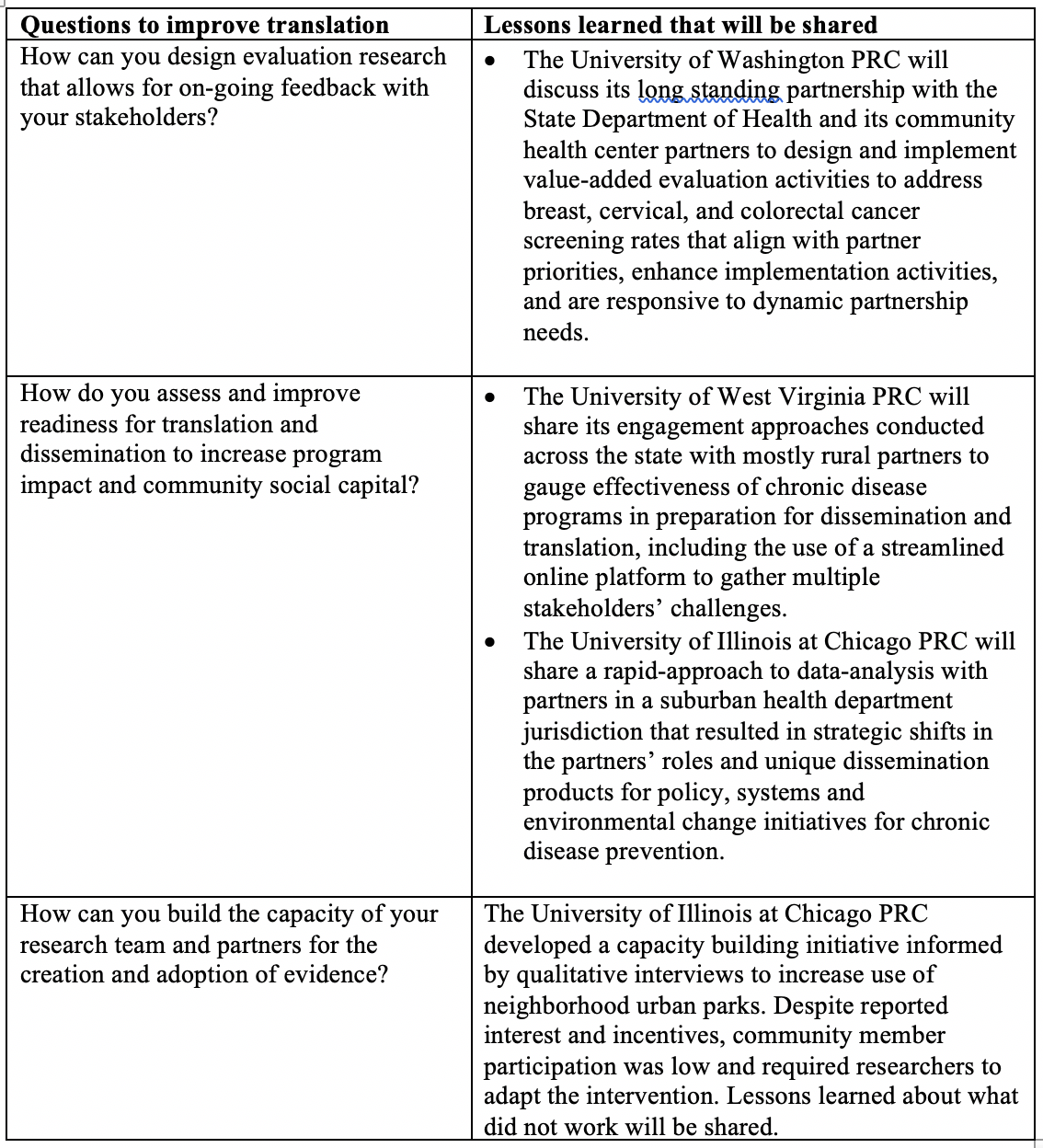
My name is Christina Welter and I am a Clinical Assistant Professor in the Health Policy and Administration Division and the Interim Director of the DrPH in Leadership at the University of Illinois at Chicago, School of Public Health (UIC SPH). One of my areas of focus and passion includes exploring how community engagement in evaluation and research can help partners build and use evidence in more relevant, timely, and meaningful ways to produce changes that matter.
Finding ways to promote the use and adoption of evidence-based initiatives in the community, also known as translation, is vital to produce effective change yet it remains a challenge for all of us. One approach to addressing this gap is through community-engaged evaluation research. I am part of the UIC SPH Prevention Research Center (PRC) and together with my colleagues at UIC SPH, the University of West Virginia PRC, and the University of Washington PRC, we will be presenting a panel at AEA this November.
Lessons Learned:
We will share examples and lessons learned about participatory approaches in different settings and levels in the public health system (e.g. neighborhood, urban, suburban, rural and statewide), and at different points in the evaluation process. Presentations and discussion will contribute to the knowledge base of how community-engaged evaluation research may increase evidence to action. Here is a sneak peak of some of the questions we will answer and tips to we will share.

The American Evaluation Association is celebrating Translational Research Evaluation (TRE) TIG week. All posts this week are contributed by members of the TRE Topical Interest Group. Do you have questions, concerns, kudos, or content to extend this aea365 contribution? Please add them in the comments section for this post on the aea365 webpage so that we may enrich our community of practice. Would you like to submit an aea365 Tip? Please send a note of interest to aea365@eval.org. aea365 is sponsored by the American Evaluation Association and provides a Tip-a-Day by and for evaluators.

Article Chosen: “TRE TIG Week: Approaches to community engagement in evaluation research to improve translation: Lessons learned from the field by Christina Welter”
Hello Christina Welter,
Reading your blog post this week allow me to connect both personally and professionally to your key insights and thoughts around community engagement in terms of evaluation. I also your professional background in health policy and administration interesting as it sheds light on a different field of evaluation as we have been focusing primarily on social program evaluation in my master of education evaluation course. Further, I am also drawn to any academic content or research involving the role of community members. I live in my small hometown of Sault Ste. Marie Ontario which is a rather remote northern community. Living in such community allows me to see the gross impact of community members and the strength and power of community involvement in academic research or professional development.
In addition, I am very eager to learn more about your work with community- engaged evaluation. Your work seems impactful and like it will lead to progressive development in the field of evaluation as a whole. Through readings and literature with in my professional master of education course I read one article that connected to this concept of community – engaged evaluation. Weiss’ article “Have We Learnt Anything New About The Use of Evaluation” speaks to the limitations of an evaluator working solo. Rather, Weiss suggests that when we as evaluators consult and partner with other key members of our communities or likeminded organizations we can enhance the evaluation process as a whole. I will leave a reference to the article I am speaking of below for your own interests.
Moreover, I also noticed in your first box of questions in your chart you mentioned the importance of utilizing stakeholder feedback and the evaluation process. This too was something we focussed heavily on in our course and in the evaluator process, ensuring stakeholders have a role in the evaluation process ultimately strengthens the process. However, it is interesting to bridge your idea of community-engaged evaluation with the partnership of stakeholders in the evaluation process. It will be interesting to read more about how this played out and how it impacted the evaluation process as a whole. Your work in the field of evaluation is progressive, creative, and impactful I enjoyed reading your article thoroughly and I will look out for more of your contributions to the field!
Thank you,
Hannah Caicco
Article Mentioned: Weiss, C. H. (1998). Have we learned anything new about the use of evaluation? American Journal of Evaluation, 19, 21-33.